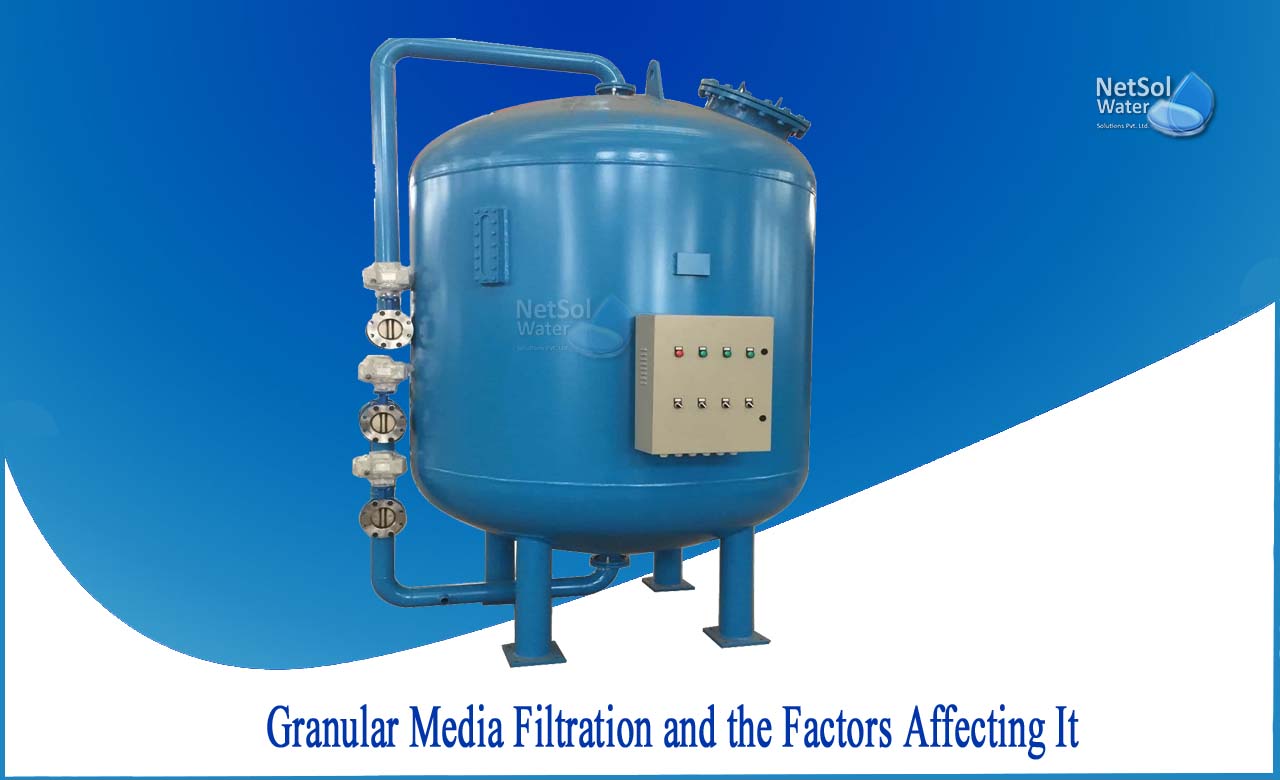What is granular media filtration?
Granular media filtration (GMF) is a process for removing suspended or colloidal particles remaining after secondary unit processes. It reduces turbidity of wastewater and improves clarity by removing various sized particles.
The filter media consists of a bed of granular particles having adsorptive properties and are beneficial in removing some biological and chemical contaminants in the wastewater.
Composition and working of Granular Media Filter
Granular media filter consists of a rectangular concrete basin. The granular bed is contained within this basin and is supported by an underdrain system which allows the filtered liquid to be drawn off while retaining the filter media in place. As water containing suspended solids passes through the bed of filter medium formed of sand, anthracite and activated carbon, the particles become trapped on top of the bed, forming floc that accumulates on the top of the filter media.
When there is too much build-up, the filtration rate is reduced at a constant pressure unless an increase in the amount of pressure is applied to force the wastewater through the filter bed. To prevent plugging of the upper surface and uppermost depth of the bed, the filter is backwashed at high velocity to dislodge the filtered particles. The backwash water contains high concentrations of solids and is sent to further treatment steps within the wastewater treatment plant.
Types of Granular Media Filtration process
There are two forms of filtering in this process: depth filtration and surface filtration.
a) Depth filtration: This is a unit operation that includes passing wastewater through a granular media filter bed to remove particle debris suspended in the effluent of biological and chemical treatment. It's also utilized as a membrane filtering pretreatment step. Filter bed with varying specific gravity and effective size multimedia will be employed to facilitate filtering at the deeper levels of the filter bed. It is often used to enhance the removal of suspended particles from primary and secondary treatment wastewater.
b) Surface filtration: This method includes mechanical sieving of particulate matter floating in a liquid and passing the liquid through a thin filter media. To make the media graded, the casing has a finer effective size and a higher uniformity coefficient.
What are the various factors affecting Granular Media Filtration?
Factors that affect granular media filtration include:
a) Turbidity: The lower the turbidity in the filter influent, the longer the filter run and hence, better the performance.
b) Media: The coarser the media, the less is the head loss, the longer is the run, and vice versa.
c) Depth: The deeper the bed, the better is the filtration.
d) Backwashing: Backwashing a filter correctly is critical to its good operation. Washing media incorrectly can result in media loss, mixing, mud balls, fractures, and craters. All of these variables contribute to poor filtering and excessive turbidity in the effluent.
e) Filtration rate: The higher the loading, the shorter the filter runs, and less efficient is the filter.
f) Temperature: The higher the temperature, the better is the performance.
g) Water stability: Higher pH (over 9.3) and calcium carbonate concentration of water can generate calcium carbonate deposition on media particles in lime softening facilities. The calcium carbonate build-up causes the media to expand and mud balls to develop.
Lowering the pH below 9.3 is required to stabilize the water. To further remedy this problem, a little quantity of a polyphosphate, such as sodium hexametaphosphate, is added as a sequestering agent. Too much poly-phosphate can produce excessive calcium carbonate sloughing from media particles, resulting in increased turbidity, while too little may not provide appropriate sequestering.
h) Polymer dose: A small dose (0.5 - 0.75 mg/L) of a polymer is helpful in forming a micro floc mat to aid the filtration. A higher dose causes cracks in the filter mat, and a lower dose do not form an effective micro floc.
How can Netsol Water help you in this?
Netsol Water is one of the leading water and wastewater treatment company in India offering projects and services in the field of water and wastewater treatment plant manufacturing and supplying machines which not only turns your wastewater into usable water but also acts as a savior of Mother earth and its precious resource “water”.
Netsol Water is Greater Noida-based leading water & wastewater treatment plant manufacturer. We are industry's most demanding company based on client review and work quality. We are known as best commercial RO plant manufacturers, industrial RO plant manufacturer, sewage treatment plant manufacturer, Water Softener Plant Manufacturers and effluent treatment plant manufacturers. Apart from this 24x7 customer support is our USP. Call on +91-9650608473, or write us at enquiry@netsolwater.com for any support, inquiry or product-purchase related query.



